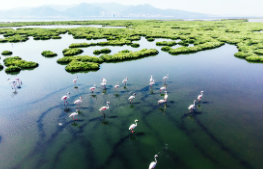Wetlands Vital in Global Biodiversity Strategies
The UN Biodiversity Conference is currently underway in Cali, Colombia. A recent assessment by 35 percent ltd, commissioned by Wetlands International, marks the importance of wetlands in National Biodiversity Strategies and Action Plans (NBSAPs). This assessment follows COP15, where nations were urged to revise their biodiversity plans in line with the Kunming-Montreal Global Biodiversity Framework (KMGBF).
Importance of Wetlands
Wetlands are vital ecosystems. They provide essential services such as:Protecting and improving water quality.
Providing habitats for wildlife.
Storing floodwaters.
Maintaining surface water flow during dry periods.
These services support 40 percent of the world’s biodiversity. However, wetlands are disappearing faster than any other ecosystem.
Key Findings
The report revealed several important findings:83 percent of submitted NBSAPs explicitly mention wetlands, inland waters, or freshwater.
100 percent of submissions from Africa and Oceania included these terms.
Over 90 percent of European nations mentioned wetlands.
Wetlands are included under key targets related to the KMGBF:71 percent of plans articulate specific measures for restoration (Target 2).
50 percent include protections for wetlands (Target 3).
Despite these positive mentions, many NBSAPs lack specific, measurable targets for wetland conservation and restoration.
Specific Wetland Types
The review identified 16 NBSAPs that mentioned specific wetland types, including Mangroves, Rivers, Lakes, Peatlands Mangroves, rivers, and lakes were the most frequently mentioned, indicating their significance for environmental targets. However, major wetland areas like the Amazon River Basin and Hudson Bay Lowland were rarely addressed in national strategies. This oversight is concerning given their importance for biodiversity and climate regulation.
Need for Improvement
The report stresses the need for countries to better integrate wetlands into their biodiversity targets. Specific, measurable goals for wetland restoration and protection are essential. Focusing on key wetland areas will enhance regional and global ecological health.The UN Biodiversity Conference is currently underway in Cali, Colombia. A recent assessment by 35 percent ltd, commissioned by Wetlands International, marks the importance of wetlands in National Biodiversity Strategies and Action Plans (NBSAPs). This assessment follows COP15, where nations were urged to revise their biodiversity plans in line with the Kunming-Montreal Global Biodiversity Framework (KMGBF).
Website: International Research Awards on Civil and Environmental Engineering.
Visit: civil.scifat.com
NominateNow:https://civil-engineering-conferences.scifat.com/award-nomination/?ecategory=Awards&rcategory=Awardee
Twitter: x.com/LilyS2727
Facebook: facebook.com/civilengineeringaward/
YouTube: @EnvironmentalEngineering24
#Wetlands
#Biodiversity
#WetlandConservation
#EcosystemServices
#NatureConservation
#BiodiversityProtection
#WetlandRestoration
#SustainableEcosystems
#ProtectOurWetlands
#WetlandsMatter
#WetlandBiodiversity
#ClimateAction
#HabitatConservation
#WetlandWildlife
#EcosystemHealth




Comments
Post a Comment